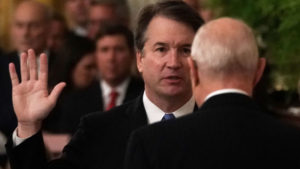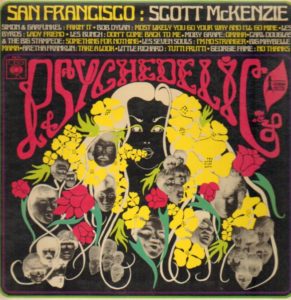Summer of Love to Altamont Murder: Innocence, Guilt and Corporate Compliance In A Kavanaugh Era
Reading Time: 5 minutes.

The recent furor over the nomination and confirmation of Judge (now Justice) Brett Kavanaugh puts us in mind of a messy truth for companies and businesspeople who must deal with investigations and charges of all stripes, whether as the investigator (in conducting a corporate internal investigation, for example) or as the subject of the charges (a grand jury investigation, or a regulatory enforcement action, or at trial). In order to create workable compliance programs; to advance a corporate culture the way we wish to; or to defend a company or its executives or employees, we need to come to terms with with a truth not so much “un-American” as “a-American,” a truth here to stay:
The “presumption of innocence” — the principle that an accused is not determined to be a guilty of a charge solely by the fact that the charge is lodged — is dead both in American culture and American courts, if indeed it was ever as viable as we pretended.

Readers of a certain age will be familiar with “San Francisco (Be Sure to Wear Flowers in Your Hair)”, the 1967 hit written by John Phillips (of The Mamas and the Papas) and sung by Scott McKenzie:
McKenzie’s wistful tune codified an innocence (or naivete) about human nature: it presumes human nature to be innocent, though corruptible, and bets on meliorism, not pessimism. It was the anthem at the apex of hippie culture during “The Summer of Love” (in San Francisco and elsewhere).
Do Not Trust The Inquisitors. Without regard to context – civil, criminal or regulatory – Government enforcement personnel, agents, and auditors align neatly with guilt presumption because “guilty until proven innocent” coincides with worldview (and, often, with budget incentives). Laypersons are often surprised that it is perfectly lawful and ethical for law-enforcement agents to lie. (Indeed, we often ask them to do so, as in undercover operations). The White House, Senate staff, and interest groups all had agendas and priorities during the Kavanaugh confirmation process, many of which had little or nothing to do with Brett Kavanaugh.
For the same reasons, simply because one believes oneself or one’s company to be in compliance does not mean that what comes out of the mouth of Government investigators, regulators and prosecutors should be taken at face value.
Do Not Expect Transparent Processes. Contrary to the movie image of the villainous executives of multinational corporations, most white-collar business persons and professionals are decent if imperfect people. They expect to be judged by pre-set standards generally known and applicable to all. Collectively, these ideas might be called “transparency.“ These ideas include identity (“Who are you, and what is your authority?“), notice (“What do you think I have done wrong, and why?“), proof (“What is the evidence that I have acted improperly, and what is its reliability?“), and appeal (“What is the higher authority to whom this matter may be ultimately directed?“).
These notions suffered, to put it mildly, in the narrative of the Kavanaugh confirmation hearings. The takeaway for businesspeople is that, as a similar narrative spreads through both the law (in the form of newly enacted or amended federal criminal and civil statutes) and through the enforcers of those laws, transparency-in-the-process will suffer – and very little can be done about it.

Adhere To Unnecessary Ethical Practices. By their nature, investigations look backwards in time rather than prospectively. Even with the best of intentions, that analysis involves the same degree – and, sometimes, a great degree – of second-guessing regarding decisions about finance, accounting, investing or human resources that seemed mundane at the time.
Anticipate the second-guessers by paying especially close attention to the blocking and tackling of ethics, especially with regard to conflicts of interest, human resources reviews and expenditure of company money.
Assume Collateral Damage.
Even with a robust presumption of innocence, any investigation — internal or external — can be destructive, intentionally or otherwise. In the internal-investigation equiavlent of a post-Altamont world, counsel must unhappily assume that the innocent and ignorant will suffer along with the guilty and the clever.

Double Down On Documentation (Or Don’t Write Anything Down).
Guilt-presumption compunds another problem: past events are viewed through a current lens. The compliance documenter — and the internal investigator, for that matter — must write for a future, unknown reader. Otherwise, he or she should write down as little as possible so that the authoritative version is that which rolls off the investigator’s tongue.
Do Not Waive Privileges.
The Government coos over the value of cooperation. Sometimes, cooperation generates value in the sense of focusing fire on its own people, rather than on the organization itself. More often, however, “cooperation” is, as Scripture holds, “a mist that appears for a little time and then vanishes” (James 4:14). The Government makes business-crime cases out of paper — your paper. It is troubling how often organizations (and their jittery clients) give up privileges. If your privilege claims are well-founded, go defend them in court. The crime-fraud exception is not easy to overcome, and you may thereby avoid the fate of otherwise innocuous communication being turned against the company, its officers and employees, and perhaps its clients.